Medicine, Technology and the Household in Modern Britain
Dr Roberta Bivins, Professor Hilary Marland
The project investigates transformations in healing activities in the home in the 19th and 20th centuries, exploring the ways in which the household adapted and expanded as a bastion of health management, self-care and therapeutic decision-making, and challenging the assumption that the home declined in importance as a therapeutic space following an early modern heyday. The project aims to challenge models of medical modernity as catalysed by professional rather than domestic agendas. We are particularly interested in exploring the integration of new domestic technologies into household practice, ranging from mundane, everyday technologies, such as bathroom scale and bathing apparatus, through to home dialysis and DNA testing kits. The project explores the role of the ‘active patient’ between 1800 and 1990 and questions how far this period saw a shift from ‘holistic’ to ‘scientific’ approaches and from broad-spectrum to highly specialised medical technologies. Professor Hilary Marland will interrogate what she suggests was a major increase in the scale and variety of medical activities located in the nineteenth-century household, with particular emphasis on London and the northern manufacturing districts. Dr Claire Jones will focus on the role of the commercial sector in facilitating an expansion of household practices that allowed emergent medical industries intimate access to domestic lives, through the case study of contraceptive technologies before the Pill, 1860-1960. Dr Roberta Bivins will examine the relationships and practices forged by doctors and patients through the negotiated high- and low-technological spaces of the twentieth-century home from 1900 until the new NHS ‘internal market’ reshaped British health and social care in 1990.
 |
Events
|
 |
Publications |
|
|
Conferences / seminar papers |


